- Policy
- Structure
- Surveys for suppliers
- Responsible Procurement based on Wood Raw Material Procurement Guidelines
- Supplier Monitoring
- Compliance with the Clean Wood Act
- We Are Committed to Fostering Sustainable Supply Chains Through Active Participation in Key Initiatives.
- Data
Policy
Corporations’ responsibilities to society in the global supply chain have become increasingly important as the globalization of the economy progresses and demand for the resources in developing countries increases.
In its procurement of raw materials, the Oji Group is expanding its sustainable procurement practices that consider the environment and society. The Oji Group Supply Chain Sustainability Action Guidelines and Wood Raw Materials Procurement Guidelines are shared with each procurement department. In addition, we ask new suppliers to understand this policy before doing business with us, and when the guidelines are revised, we ensure that all suppliers are thoroughly informed of the revisions, and we work to ensure our procurement activities are responsible and sustainable in line with these guidelines.
These guidelines are structured in accordance with the three internationally important principles below.
- Comply with laws and social norms, engage in fair trade and prevent corruption
- Consider the environment (address climate change, reduce environmental impact, preserve biodiversity, etc.)
- Care for society (respect human rights, ensuring appropriate working environments, etc.)
Furthermore, if significant violations of the Oji Group Sustainability Action Guidelines for Supply Chains are identified through surveys or other assessments conducted with suppliers, we will engage in dialogue with the suppliers and request improvements. We will not procure from suppliers who do not make the necessary improvements.
Revised: February 26, 2024
Oji Group Sustainability Action Guidelines for Supply Chains
Oji Holdings Corporation
Basic Approach
The Oji Group has established Sustainability Action Guidelines for its supply chains. It communicates these guidelines to its suppliers and expects them to understand and comply with the guidelines.
Requests to Suppliers
The Oji Group requests its suppliers to fulfill each of the requests below. The Group will collaborate with them to fulfill the requests.
The Group expects suppliers to collaborate with their own suppliers to fulfill the requests.
(1) Compliance with laws, regulations, and social norms, fair trade, and anti-corruption measures
- Comply with relevant laws and regulations and international treaties.
- Thoroughly ensure fair trade practices and institute anti-corruption measures.
- Ensure that all products and services meet the required standards of quality.
(2) Consideration for the environment
Consider the impact of business activities on communities, biodiversity, pollution, and other environmental issues. Strive to reduce the usage of energy, water, and other resources, as well as greenhouse gas emissions and waste production. Promote sustainable CO2 fixation by conserving forests and implementing other means.
- Enhance the environmental management system.
- Reduce the amount of waste and use resources effectively.
- Address climate change.
(Reduce greenhouse gas emissions mainly through energy conservation and promote the absorption of CO2 and sustainable CO2 fixation chiefly by conserving forests) - Preserve biodiversity.
- Reduce environmental impact.
- Manage chemical substances.
- Manage water resources.
(3) Care about society
- Respect human rights. Prohibit discrimination, harassment in any form, and inhumane treatment, including corporal punishment and abuse.
- Prevent employees from being involved in forced labor or child labor. Prohibit the employment of children under the minimum employment age.
- Prohibit discrimination in employment based on gender, race, religion, or any other social attributes.
- Ensure that wages are above the legal minimum wage.
- Respect employees’ right to organize and bargain collectively.
- Make sure to follow the legal regulations on the maximum number of work hours and avoid excessive work hours.
- Make sure to provide a safe, hygienic, and healthy working environment for employees.
- Uphold and advance safety and health in the entire supply chain.
- Contribute to local communities and society
(4) Communication with society
- Communicate with stakeholders to build trust.
- Respect overseas culture and customs.
- Protect and disclose information appropriately.
- * The Oji Group Partnership Procurement Policy has been renamed the Oji Group Sustainability Action Guidelines for Supply Chains.
- * These action guidelines apply to all raw materials that the Oji Group procures. The Group has established Wood Raw Materials Procurement Guidelines separately.
- * The Group effectively promotes sustainability procurement by monitoring its impact on the environment and society.
Translation of Oji Group Sustainability Action Guidelines for Supply Chains
Wood Raw Material Procurement Guidelines
The wood used for making paper is an excellent resource that can be renewably produced through sustainable forest management. When managed and used appropriately, forest resources can contribute to the prevention of global warming (through the absorption and storage of carbon dioxide), the conservation of water resources and the preservation of biodiversity.
We ensure that there is no deforestation or illegal logging in our management and use of forests. We maintain and enhance our forest-related environmental values, and at the same time we are aware that we must also fulfill our other responsibilities to society, such as our responsibility to respect human rights and protect labor and traditional rights in our forest operations. Understanding this, the Oji Group established its Wood Raw Material Procurement Guidelines, a part of the Oji Group Sustainability Action Guidelines for Supply Chains, to facilitate the responsible sourcing of wood raw materials from all wood chips and pulp suppliers who share our commitment to these guidelines.
Furthermore, amidst society’s growing concerns regarding human rights issues and deforestation, the Oji Group revised its Wood Raw Material Procurement Guidelines in March 2023 to respond to these social issues and it continues to review them as necessary.
We also communicate the content of revised guidelines to suppliers around the world by creating both Japanese and English language versions of the guidelines and disclosing them on our website.
Wood Raw Material Procurement Guidelines (Revised in 2024)
The Oji Group requires and verifies that all suppliers produce sustainable wood raw materials. We will responsibly procure materials by examining wood raw materials from all suppliers to ensure their traceability and purchasing materials only from properly managed forests. If the source or forest management status of the purchased wood is unknown or the wood does not conform to our requirements regarding the following, we will engage in a dialogue with the supplier and request improvements. We will not source from suppliers who do not make improvements.
- Raw materials production area (logging area, forest ownership form, differentiation between plantation wood and natural forests)
- Forest management method (applicable forestry laws, forest management regulations)
- Acquisition status for forest certification
- Avoidance of illegal logging (verification of forest certification, harvest permits, records of round logs received.)
- Avoidance of wood from natural forests being converted to wood from plantations or non-forest land use
- Avoidance of genetically modified (GMO) wood
- Avoidance of logging in High Conservation Value (HCV) Forests
- Avoidance of raw materials associated with major social conflicts
- Ensuring the protection of human rights and labor rights
We will also utilize the FSC™ or PEFC forest certification systems to verify the sustainability of procured raw materials. We will survey imported wood chips on a per-ship basis. Domestic woodchips and pulp, which have smaller purchase volumes, will be surveyed once a year.
Structure
Sustainability Management (Governance) Structure
Matters related to supply chain risks (environmental risks, human rights risks, etc.) and their countermeasures are deliberated by the Sustainability Committee and monitored and supervised by the Board of Directors. An executive in charge of Oji Green Resources, which oversees the procurement of key raw materials, participates in the Sustainability Committee. Matters to be discussed by the Committee includes '8. Supply chain sustainability risks and responses to them'.
| Targets | Conduct sustainability surveys for main suppliers |
|---|---|
| Results | Conducted sustainability surveys of recovered paper, pulp, base paper, woodchips, chemicals, fuels (PKS, RPF, fossil fuels, etc.) and subsidiary materials (film substrates, inks, etc.) |
Surveys for suppliers
Under the Oji Group Sustainability Action Guidelines for Supply Chains, the Oji Group conducts the following surveys with its suppliers.
Supplier Sustainability Surveys
As the globalization of the Oji Group’s business and supply chain progresses, it is becoming increasingly important to place greater emphasis on sustainability elements such as environmental consideration, labor conditions, and human rights. It is essential to understand actual conditions on the ground, manage risks, respond to requests for improvement, and conduct procurement activities accordingly.
In light of the current social context, the Environmental Action Program 2030 incorporates the following statement:
“Procurement and manufacturing that consider the environment and society under compliance with laws and regulations through supplier risk assessments.”
This reflects our approach to maintaining and strengthening corporate sustainability and the trust of stakeholders.
As part of this initiative, we have conducted supplier sustainability surveys of major suppliers since FY2020.In FY2024, we conducted a questionnaire-based sustainability survey using the assessment platform provided by the third-party organization Asuene Inc. The survey was designed with reference to internationally recognized documents, including the Guiding Principles on Business and Human Rights endorsed by the UN Human Rights Council.
If any compliance violations are identified through these surveys, we will engage in dialogue with the suppliers and request improvements. If no modifications are made, we will stop procuring from that supplier.
Major suppliers:Suppliers accounting for the top 75% of the Oji Group’s transaction value (approximately 1,000 companies)
Summary of Survey Results (FY2020-FY2024)
In FY2024, the Oji Group conducted a sustainability survey targeting 230 companies, receiving responses from 157 of them. Looking at the five-year total from FY2020 to 2024, the survey covered 1,185 companies in total, with 859 suppliers responding—an overall response rate of approximately 73%.
The survey evaluated companies across eight ESG-related categories, with a maximum possible score of 800 points. The average total score was translating to a score rate of about 60%. In the FY2024 survey, 14 companies were rated D and 0 were rated E.
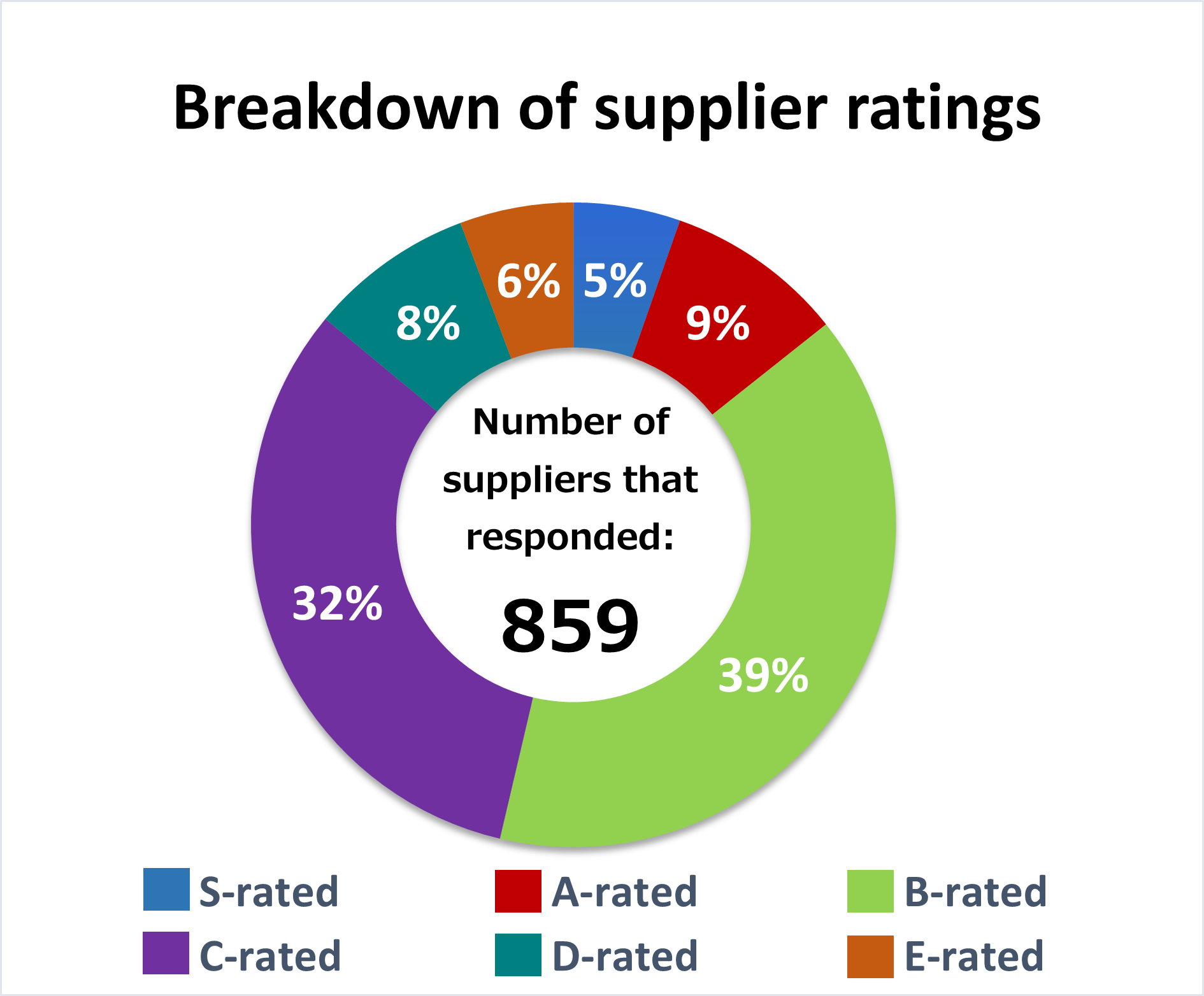
| Score rating | Criteria | Number of suppliers |
|---|---|---|
| S | 750 or more | 46 |
| A | 650 or more but less than 750 | 77 |
| B | 500 or more but less than 650 | 338 |
| C | 250 or more but less than 500 | 278 |
| D | 100 or more but less than 250 | 71 |
| E | Less than 100 | 49 |
| Total score | Perfect score: 800 | 859 |
Rating based on the total score of eight items
Eight items from an ESG perspective
- Corporate governance
- Human rights
- Labor
- Environment
- Quality and safety
- Basic attitude toward the supply chain
- Harmonious coexistence with local communities
- Information security/protection and fair corporate activities
Follow-up and Future Initiatives
Using the results of the Supplier Sustainability Survey, the Oji Group provides guidance to suppliers (follows up with them) to encourage compliance and the implementation of measures regarding the items listed in the Oji Group Sustainability Action Guidelines for Supply Chains, and it strives for continuous improvement. Additionally, starting in FY2024, we have held briefing sessions for major suppliers who participated in the survey, as part of training aimed at enhancing supplier capabilities, to enhance understanding of the survey results.
Going forward, we will continue conducting surveys of major suppliers and work to improve the response rate.
Sustainability survey on wood pulp contained in purchased base paper (procured from base paper manufacturers) (FY2022-2024)
In FY2022, a survey of the wood pulp contained in purchased base paper (base paper manufacturers), which had not previously been included in surveys, was conducted to examine the legality of the paper (including wood-based paper) procured by the Japan Forestry Agency (JFW). Of the 531 brands (excluding customer-designated base paper), five brands contained wood where the origins of the materials were unknown.
As the origins of the materials were unknown, we began switching brands in FY2023, and by May 2024, all of the purchased base paper is base paper where 100% of the wood used has been verified as legal.
| Survey Target | Number of brands | Ratio | Notes | |
|---|---|---|---|---|
| Base paper purchased | 531 | 100% | Excluding customer-specified base paper | |
| Breakdown | Base paper for which the legality of the wood used has been verified | 531 | 100% | Forest certification, etc. acquired |
| Base paper for which the origin of the wood used has not been identified | 0 | - | Switching completed | |
| Others | 39 | - | Customer specified base paper | |
Human rights due diligence for suppliers (FY2022-2024)
The Oji Group requires its suppliers to respect human rights in their responsible supply chain activities, etc.
A risk assessment was conducted in accordance with the Practical Reference Materials On Human Rights Risks.
The evaluation was conducted from four perspectives.
- Sector and business area risks
- Risks associated with products and services
- Regional risks
- Company-specific risks
This assessment identified 159 suppliers identified as high risk in three years, and we prioritized these companies in our human rights due diligence.
For more information about the Group’s implementation of its human rights due diligence activities, please visit the following public Oji Holdings website.
Human rights and environmental due diligence
The Oji Group conducts human rights and environmental due diligence for priority suppliers --those with high risks in human rights and environmental areas --among its business partners, in accordance with the procedures described in the United Nations Guiding Principles on Business and Human Rights. Through this process, we mitigate and remedy actual or potential negative impacts that have become apparent or may arise in the supply chain.
In the Environmental Action Program 2040, formulated in May 2025, we have set a target to conduct human rights and environmental due diligence for suppliers at least once a year, and we are committed to promoting supply chain management.
Oji Group Supplier Risk Assessment Process
The Oji Group identifies and assesses actual or potential negative impacts across its business activities and the entire value chain, and determines material topics. In particular, for business transactions, we quantify the severity of negative impacts on human rights and the environment as risks, following the “Supplier Risk Assessment Process” described below, and rank suppliers with high risks in human rights and environmental areas. Through this process, we determine priority suppliers subject to human rights and environmental due diligence. The supplier risk assessment process is reviewed by the “International Development Center of Japan”, a third party with specialized expertise.
Assessment Framework
The supplier risk assessment process is developed with reference to GRI 1: Foundation 2021, GRI 3: Material Topics 2021, and relevant topic standards. Supplier assessments under this process are conducted annually.
Supplier Risk Assessment Method
Supplier risk assessment is conducted by quantifying the “risk (R)” as the significance of negative impacts, defined by the following formula. This assessment method is reviewed periodically.
R = Severity × Likelihood
Severity is defined and quantified on a scale of 1 to 5, based on the scale, scope, and irremediable character of the significance of negative impacts on human rights and the environment, with reference to GRI 3, and using transaction value and the results of the aforementioned supplier sustainability surveys.
Likelihood is defined and quantified on a scale of 1 to 5, based on “country risk” for the country of origin of raw materials supplied by the supplier, with reference to internationally recognized documents, and considering risks such as child labor, forced labor, and corruption.
Extraction of Priority Suppliers
Based on the above assessment results, suppliers whose quantified risk exceeds a set threshold are extracted as priority suppliers. In addition, suppliers for whom actual negative impacts on human rights or the environment have been identified due to the nature of the goods or services supplied are also extracted as priority suppliers, regardless of the risk assessment.
Initiatives in FY2024
In FY2024, we developed the above supplier risk assessment process in preparation for the implementation of human rights and environmental due diligence. Going forward, we will determine priority suppliers in accordance with the supplier risk assessment process and implement human rights and environmental due diligence.
Responsible Procurement based on Wood Raw Material Procurement Guidelines
Traceability Verification and Procurement Status
In accordance with its Wood Raw Material Procurement Guidelines, the Oji Group procures wood raw materials exclusively from responsibly managed forests. We collect traceability reports that include verification items such as the origin of the wood, forest management practices, the absence of illegally harvested wood or wood from high conservation value forests, and respect of human rights. The origin of wood raw materials is traceable throughout the entire supply chain—from forests to chip, pulp, and paper mills. We obtain traceability reports from all wood raw material suppliers, covering specified verification items. These reports are audited and validated by third-party organizations, and the results are disclosed in the “Wood Raw Material Procurement Guidelines: Implementation Status Report” below.
In FY2024, the Oji Group procured 4,337 thousand BDT (bone dry tons) of chips and 160 thousand ADT (air dry tons) of purchased pulp from domestic and international sources. We obtained traceability reports from all suppliers (295 chip suppliers and 28 pulp suppliers), achieving a 100% collection rate. These reports were audited by third-party organizations to verify compliance with the Wood Raw Material Procurement Guidelines and proper procurement procedures.
In major overseas chip-supplying countries, the Oji Group assigns resident employees who oversee shipments, provide quality guidance, and conduct business meetings with suppliers. During shipments, the origin of raw materials and forest management practices are verified, and traceability reports are obtained from suppliers. In particular, legality is confirmed by checking the status of documentation such as forest certifications, logging permits, and records of log deliveries. Domestically, personnel are stationed at key locations to conduct business meetings with chip suppliers and regularly verify the origin of raw materials and forest management practices, while obtaining traceability reports.
If any cases are identified where forest certification or procurement standards are not met, the Oji Group requests improvements through dialogue with the supplier. If no improvement is observed, procurement from the supplier is suspended. Furthermore, we continuously provide corrective support, including the provision of relevant information and best practice examples, to ensure suppliers understand and comply with certification standards, relevant laws and regulations, and the requirements outlined in the procurement guidelines.

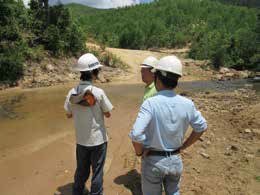
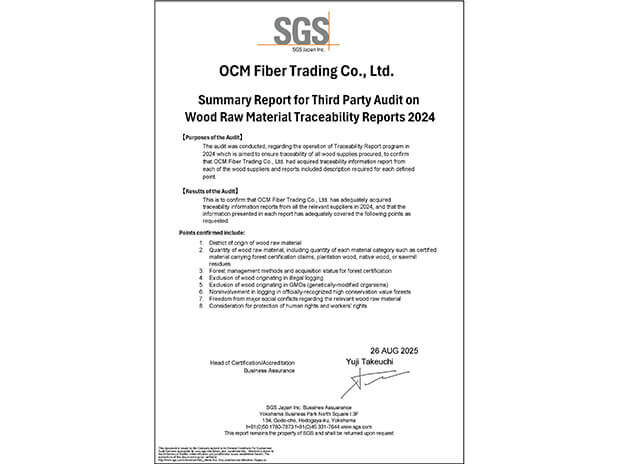
Supplier Monitoring
The Oji Group conducts annual visits to the mills and forest sites of wood raw material suppliers to verify the storage and record-keeping of logging permits and related documents that form the basis of traceability reports. In addition, we monitor compliance with our wood raw material procurement guidelines—covering human rights (including labor rights), health and safety, and environmental considerations—through on-site inspections and interviews.
In FY2024, we visited all 36 overseas woodchip suppliers with a record of procurement transactions. When any violations or risks are identified through monitoring, we request corrective actions from the suppliers and collaborate with them to drive improvements.
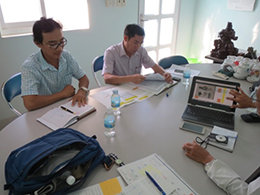
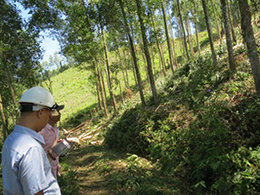
CENIBRA’s Forestation Incentive Program in Brazil
Since 1985, CENIBRA has supported small-scale local farmers through its Forestry Development Program. This initiative helps farmers practice sustainable forest management by providing seedlings, fertilizers and technical training. The program also guarantees the purchase of timber when it reaches maturity.
As of 2024, CENIBRA has ongoing contracts with 558 local farmers who have a total of 18,023 hectares of plantation forests. Approximately 14% of the wood materials delivered to CENIBRA’s mill that year came from these program participants. These long-term partnerships have created jobs, raised incomes, improved living standards and contributed to environmental conservation in the region.
CENIBRA has also implemented a satellite-based monitoring system to track the growth and management of contracted forests. This system ensures compliance with forest certification standards, including the prevention of illegal logging and the conversion of natural ecosystems. Alerts from the monitoring system enable CENIBRA staff to conduct timely field visits and engage with suppliers, fostering effective communication and sustainable practices.

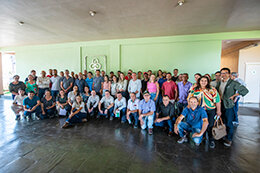
Compliance with the Clean Wood Act
In March 2018, the Oji Group completed registration as Class-1 and Class-2 Registered Wood-Related Business Operator under the Act on Promotion of Distribution and Use of Legally Harvested Wood Clean Wood *1(commonly known as the Clean Wood Act).
When procuring wood raw materials and biomass fuels, we verify the legality of our procurement activities by conducting Legality Certification Due Diligence in collaboration with the Japan Paper Association.
- *1 Enacted in May 2017, Japan’s Clean Wood Act aims to prevent the distribution and use of illegally harvested wood and promote the use of legally harvested wood and wood products. The Act defines the scope of applicable wood and wood-related business operators, establishes a registration system, and outlines the responsibilities of both businesses and the national government.
We Are Committed to Fostering Sustainable Supply Chains Through Active Participation in Key Initiatives.
The Oji Group aims to achieve a sustainable supply chain through the disclosure of information. To this end, we are participating in the CDP, a platform that increases companies’ awareness of sustainability, aiming to improve their activities, and CENIBRA in Brazil and KANZAN in Germany are also participating in Ecovadis, an organization that assesses the sustainability of supply chains.